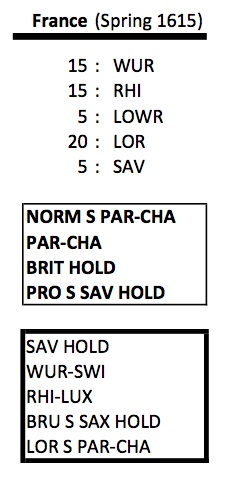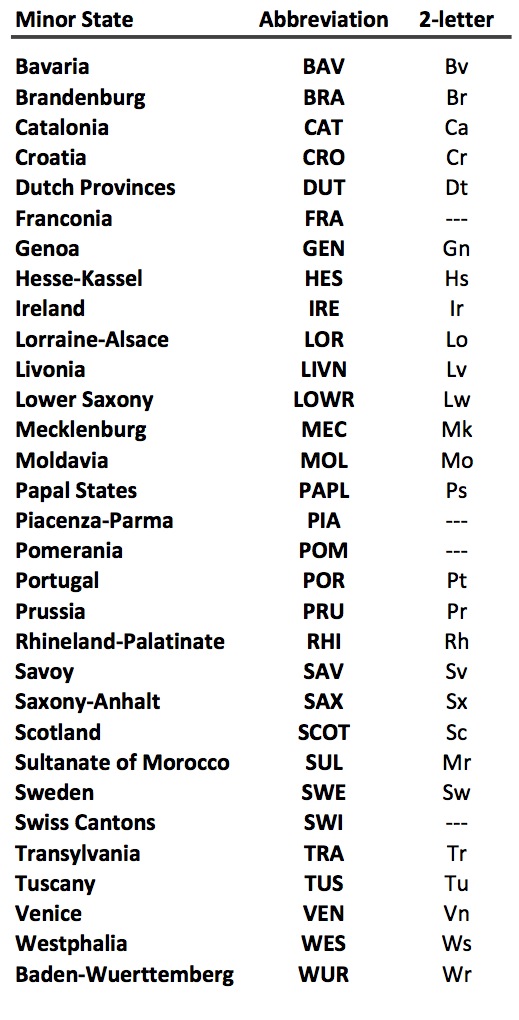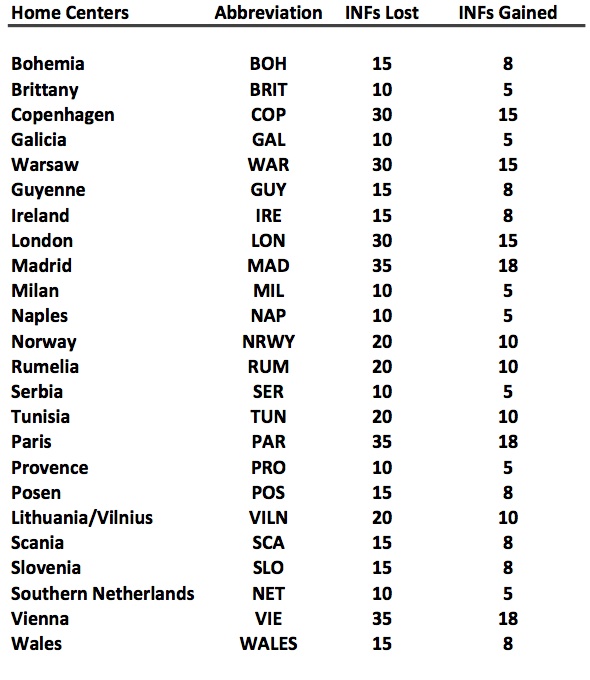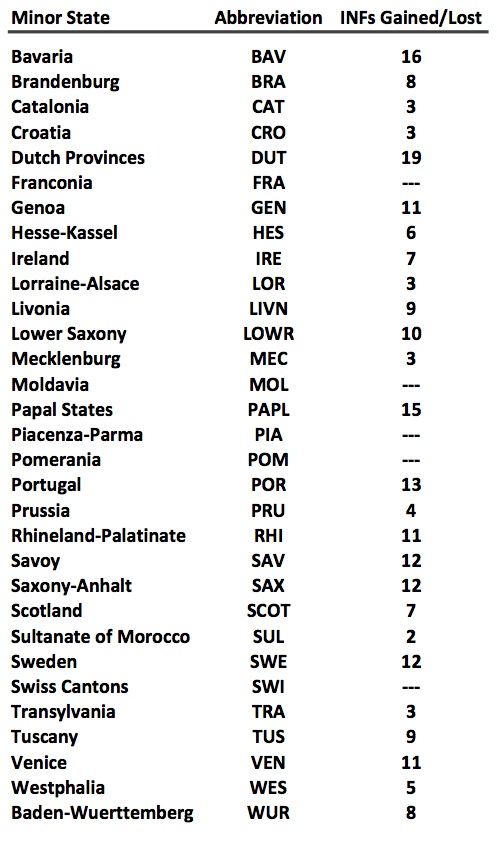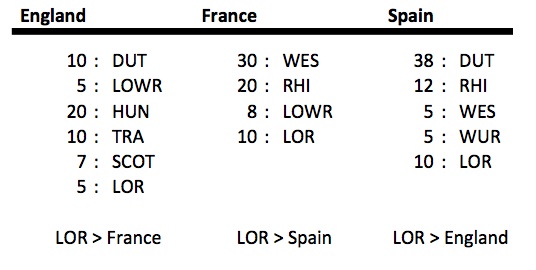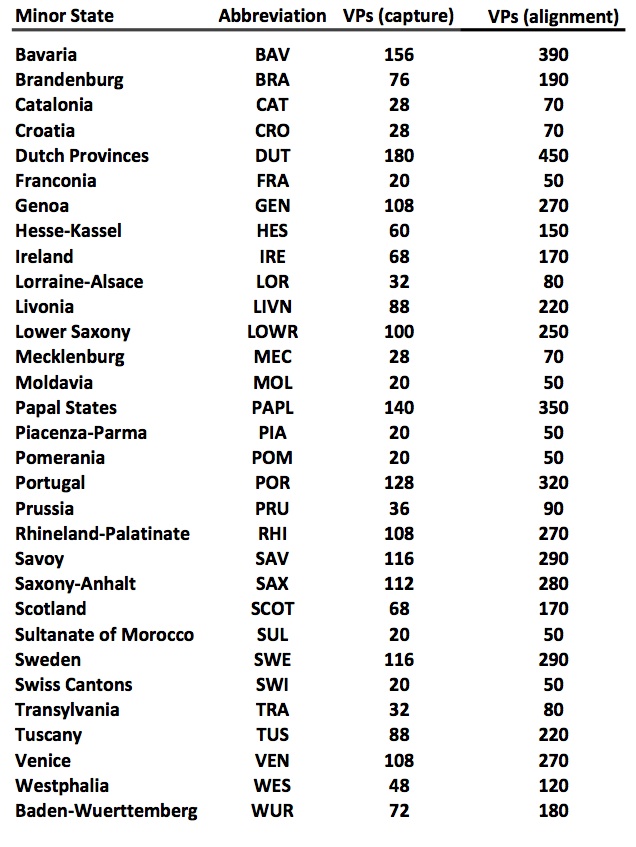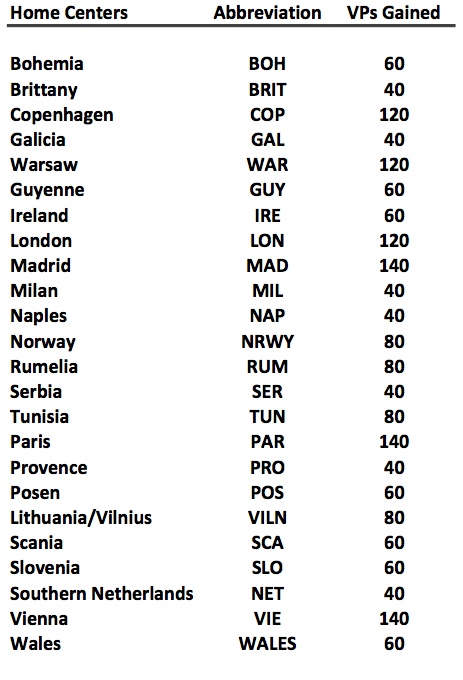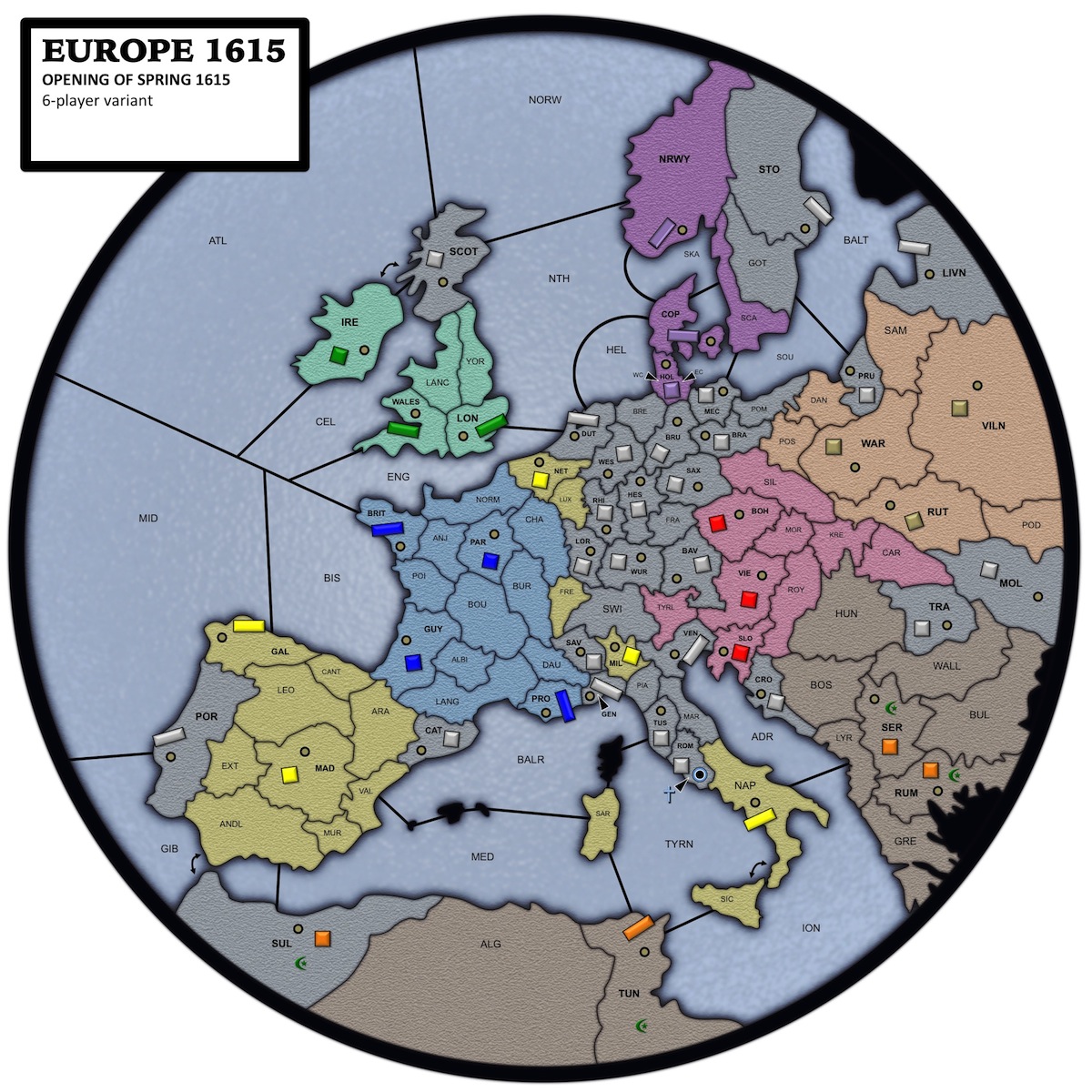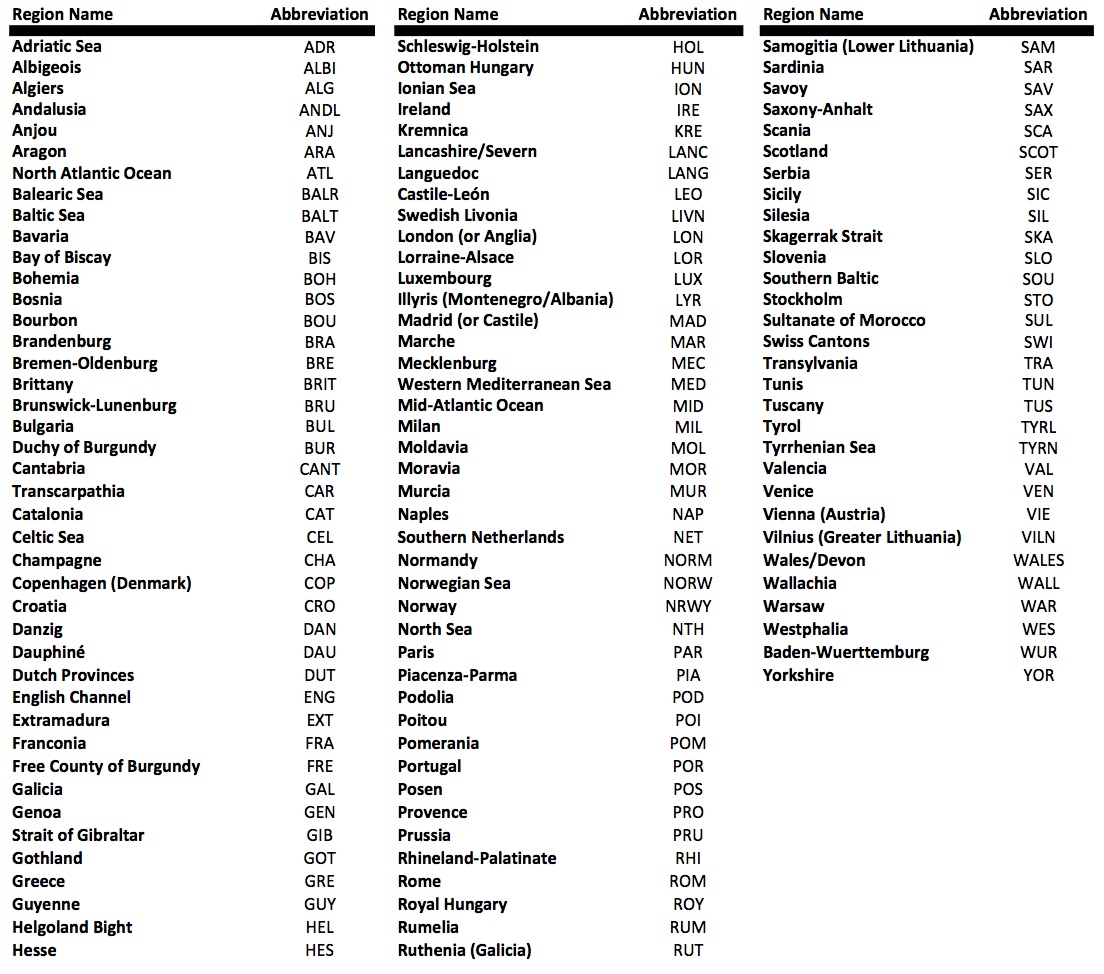Difference between revisions of "Europe 1615: Version 3"
| Line 76: | Line 76: | ||
==The Ottomans== | ==The Ottomans== | ||
| − | The Ottoman Empire (OTTM) spans over several provinces and has 3 units in its military service: A(RUM), A(BUL), and F(TUN). Before the start of the game, the GM will randomly select a player to secretly control the movements of the Ottoman units throughout the game. If other players wish to communicate with this designated player concerning the movements of the Ottoman units, they may do it through public press or confidentially through the GM. With the elimination of the designated | + | The Ottoman Empire (OTTM) spans over several provinces and has 3 units in its military service: A(RUM), A(BUL), and F(TUN). Before the start of the game, the GM will randomly select a player to secretly control the movements of the Ottoman units throughout the game. If other players wish to communicate with this designated player concerning the movements of the Ottoman units, they may do it through public press or confidentially through the GM. With the elimination of the designated player, the Ottomans take a neutral status for the remainder of the game. |
| Line 163: | Line 163: | ||
==Counterbalance== | ==Counterbalance== | ||
| − | In this game, the player of Poland | + | In this game, the player of Poland is randomly given the confessional status of Catholic or Protestant. If Poland is a Catholic power, this will give the Catholic powers an overall advantage in the total influence over the minor states by a factor of more than twice. Hence, a counterbalance must be in place to maintain some form of game balance. If total INFs of the Catholic powers in play is 2 or more times greater than the Protestant powers, then the Catholic powers cannot deploy INFs to Protestant-majority states or newly created Protestant-majority states during that time. This situation is called “widerstand” (in German, pronounced: VEE-DAR-SHTRAUNT) and will appear at the top left corner of the map so that all players are aware of it. |
If total INFs of the Protestant powers in play is 2 or more times greater than the Catholic powers, then the Protestant powers cannot deploy INFs to Catholic-majority states or newly created Catholic-majority states during that time. This situation is called “ketzenhammer” and will appear at the top left corner of the map so that all players are aware of it. | If total INFs of the Protestant powers in play is 2 or more times greater than the Catholic powers, then the Protestant powers cannot deploy INFs to Catholic-majority states or newly created Catholic-majority states during that time. This situation is called “ketzenhammer” and will appear at the top left corner of the map so that all players are aware of it. | ||
Revision as of 01:28, 19 July 2014
EUROPE 1615: VERSION 3
A DIPLOMACY VARIANT
by Matthew Medeiros
[Play-testers needed! Currently recruiting players at www.diplomaticcorp.com under Open Games (select Games > Open Games in the main menu). Any comments or questions please write to medeiros412@aim.com. Thank you.]
INTRODUCTION
The Europe 1615 Diplomacy variant allows players to take the reins of one of the great powers of the time: Austria, France, Spain, England, Poland, and Denmark. During the game, players deploy influence points (INFs) and orders to secure political and/or religious authority over the minor states and their units. The Ottoman Empire can be influenced as well, and may be controlled anonymously by any one of the players. Victory is measured by the gain of victory points (VPs) through various aspects of the game. Game begins in 1615.
Standard 5th Edition rules of Diplomacy apply with modifications as described below.
PHASES OF THE GAME YEAR
1- Initial Status Check
2- Spring Movement and Retreat Phase
3- Summer Movement and Retreat Phase
4- Fall Movement and Retreat Phase
5- Early Winter Adjustment Phase (Required Disbands)
6- Late Winter Adjustment Phase (Build Phase)
7- Scoring Phase
INFLUENCE
Deployment of influence with submission of orders
Each power receives influence points (INFs) at the beginning of each year to distribute to the minor states with (or without) orders.
INFs available per year
Note: GM will randomly determine the religious/confessional status of Poland as either Protestant or Catholic.
Writing the orders: Example of the format for the submission of the INF deployment list and orders is as follows:
In the above example, France deploys some INFs in the first phase as follows: 15 INFs to Wurtemburg (WUR), 15 INFs to the Rhineland (RHI), 5 INFs to Lower Saxony (LOWR), 20 INFs to the Lorraine (LOR), and 5 INFs to Savoy (SAV). In addition to submitting orders for French units (shown in thin-bordered box), France submits orders to the units in the minor states where the INFs will be deployed to (heavy-bordered box). Additionally, INFs may be deployed to minor states without a SC/unit, such as Franconia (FRA) and Switzerland (SWI). Powers need not deploy all INFs in the first phase, but can spread out those deployments in subsequent phases. INFs will continue to accumulate in the minor states with each deployment dictating the status of state. Any unused INFs do not carry forward into the next year, and players cannot deploy more than the available INFs for the year.
Pliant minor states
A listing of the minor states (with the Ottoman Empire) that may be influenced is given below.
TABLE 1: List of Pliant Minor States
Note: The Catholic powers, only, may deploy INFs & submit orders to the Papal States (PAPL) which consist of Rome (ROM) and the Marche (MAR). Two-letter designations for each minor state are given to label the armies/fleets on the board.
The Ottomans
The Ottoman Empire (OTTM) spans over several provinces and has 3 units in its military service: A(RUM), A(BUL), and F(TUN). Before the start of the game, the GM will randomly select a player to secretly control the movements of the Ottoman units throughout the game. If other players wish to communicate with this designated player concerning the movements of the Ottoman units, they may do it through public press or confidentially through the GM. With the elimination of the designated player, the Ottomans take a neutral status for the remainder of the game.
Gain and loss of influence
Powers also receive additional INFs from the capture of a supply center (see Tables 2-A and 2-B). This gain is maintained as long as the power captures (at the build phase) and maintains control of the minor state. A power will lose INFs from the loss of a home supply center (after the build/adjustment phase) equal to the INF value of the supply center (see Table 2-A). Armies of neutral minor states that occupy a home supply center will have no effect on the gain of INFs.
TABLE 2-A: List of Home Supply Centers and INF values
INFs Lost = The number of INFs lost should the SC be captured by an opposing power.
INFs Gained = The INFs gained with the capture of the SC.
TABLE 2-B: List of Minor States and INF values
EFFECTS OF INFLUENCE AND RULES GOVERNING THE STATUSES AND ACTIONS OF THE MINOR STATES
Rules concerning political status of minor states
The minor state is marked as ALIGNED, NEUTRAL or UNALIGNED depending on how the major powers invest INFs in the minor state. Minor states marked as ALIGNED are in allegiance with the major power holding the most influence (50% or more of the total INFs deployed to the state) and will follow the orders submitted by the power. For two powers equally invested in a minor state (50/50), the minor state will be marked as NEUTRAL and the orders submitted to those states will be ignored. After submission of orders and INF deployment, the GM publishes the results, which powers have deployed to which states and whether the orders submitted are followed or not, but does not reveal the actual number of INFs deployed by each power; instead, the percentage of INFs held is published.
Capture and neutrality. Any minor state's army can capture a supply center and contribute to its expansion. If the minor state is neutral, and its unit is occupying a foreign province at the adjustment phase, the minor state will not be able to capture the province. If a minor state is unaligned it may still capture.
Dislodgment. The major power cannot dislodge or support the dislodgment of the aligned minor state's unit, even if that dislodgment is unexpected.
Disbanding. If the home supply center of a minor state is captured when the state's army is positioned elsewhere on the board, the army is disbanded at the Early Winter Adjustment Phase (irrespective to whether it holds a SC). In other words, the loss of its home supply center and the resulting adjustment (disband) is performed first before the Late Winter Adjustment Phase. (Note: This rule does not apply to the Ottomans.) The capture of the minor state's home SC also leads the disbanding of all units of the state. If the minor state has 2 or more units, and one or more of its non-home centers are captured, the aligned power will submit the orders to disband in the Early Winter Adjustment Phase.
Retreats. If the minor state's army is dislodged, it is then disbanded (no retreats are allowed for units of the minor states). However, units of the Ottoman Empire are allowed to retreat and orders must be supplied by the aligned power.
Alliance. A major power may move into its ALIGNED state if the army is not present, but cannot capture the supply center as long as it is aligned.
Capture of a minor state. If a major power captures a minor state's home supply center, then the state is withdrawn from the list of pliant minor states. It can no longer be influenced; no power, including the occupying power, will be able to deploy INFs to the minor state or perform diplomatic attacks. The occupying power will earn VPs for the capture of the supply center at the scoring phase, and additional INFs as mentioned above, but forfeits any VPs that could be earned from an alignment. The captured minor state loses any alignment status, and all INFs invested in the state are held in suspension. Any religious markers are temporarily removed.
Expansion. The Ottomans and the minor states have the ability to expand with the capture of SCs (or provinces without SCs). When a SC is captured by the minor state it becomes part of its dominion, although, not permanently. When the minor state is aligned, or made neutral, all acquired territories are colored accordingly on the map. Additionally, any power that is aligned with the minor state, at a scoring phase, will score for the state plus a bonus. The aligned power is also required to submit build orders for the minor state that acquires new SCs. Example of play: Prussia, under the influence of Denmark, moves to occupy Mecklenburg, and captures it at the build phase of 1615. Mecklenburg is "temporarily" eliminated from the list of pliant minor states. Prussia builds a new army. Denmark then scores for its alignment with Prussia and a bonus as Prussia now holds two centers. When INFs are deployed to Prussia it affects both the Prussian state and Mecklenburg. If Prussia has a religious marker, this is not transferred to newly acquired territories or centers, only the alignment or neutral status, or unaligned status. If Prussia is captured, Mecklenburg becomes "liberated" and is reestablished as a pliant minor state; the INFs in Mecklenburg will need to be reevaluated for its status. Also, in the above example, if Prussia held another power's center, such as Bohemia, then Denmark still scores for Prussia as an aligned state plus a bonus. Using this same example, if the Prussian home center is captured, the Bohemian center will be "liberated" making a new independent minor state, given that it has not been taken by another state/power. Note: Any issues that are encountered by the use of these rules, resolving them is solely at the discretion of the GM.
Alignment (Passable) and the Alliance System
For a minor state to follow the submitted orders, the major power must satisfy two conditions: deploy a required minimum of INFs, and solely hold the most INFs in the state (50% or greater). For a minor state with one supply center, a power needs to invest minimally 5 INFs; for minor state with 2 centers, a power needs 9 INFs; for 3 centers, 12 INFs; 4 centers, 14 INFs; and for 5 or more centers, 15 INFs. Orders submitted by the power to any aligned state will be followed by the unit of the state (where ever it is on the board) and reported in the adjudication. At the beginning, the Ottomans will require a minimum of 12 INFs (3 centers) for an alignment, plus the majority rule.
Note: The Ottoman Empire can never be UNALIGNED, only ALIGNED or NEUTRAL. Hence, by default, the Ottomans are NEUTRAL.
An ALLIANCE SYSTEM is established when two or more minor states are aligned with a major power; all members of the alliance can move through the other member's territories and supply centers without capture.
No alignment (passable)
Political status of a minor state is not established if no power has invested any INFs. Minor state is then considered UNALIGNED. Even if only one power has deployed INFs to a minor state but not meeting the required number of INFs, then the state is made unaligned. Any major power or minor states may move into and/or capture the unaligned state. Any power can support the hold of a minor state's unit even if the minor state is unaligned.
Neutrality (impassable)
If two or more powers have deployed INFs to a minor state, but none has met the minimum requirement for an alignment, the minor state is considered NEUTRAL. Neutrality also occurs when two powers have invest equally (50/50), or if no power has a majority of INFs in the state (less than 50%). Therefore, with a minimum of only 1 INF deployed by two or more powers to minor state, neutrality can be achieved.
If the political status is NEUTRAL, no major power can enter the minor state as it violates the neutrality status. A support, move, or convoy order may be submitted to the unit of a neutral minor state in anticipation of a change in status. If a minor state changes to a NEUTRAL status, a major power's army or another minor state's army situated in the neutral minor state can still function to support, attack, hold, etc. If the army moves out of the neutral state, no other army can enter, but while holding its position in the neutral state it is open to attack and dislodgment (since the neutral state harbors a foreign active unit, other states have the right to attack). A major power's army or another minor state's army situated in a neutral state can receive support. On another note, if the minor state becomes neutral after its army has moved, the state's army holds its position where ever it is on the board, and is disbanded if dislodged. Neutral army's position may be supported if it is not in its state of origin.
Religious/confessional status of the minor states
The combined INFs remaining for Protestant powers represent the influence of the Protestants in the state. The combined INFs of the Catholic powers represent the influence of the Catholic in the state. The religious status of the minor state is MAJORITY if a single religious faction solely holds the minimally required number of combined INFs and 50% or more. The minimum is dependent on the size of the minor state. For a state that is one province in size, the required number of INFs is 5; for a 2-province minor state, the minimum is 9 INFs; for 3 provinces, 12 INFs; for 4 provinces, 14 INFs; and for 5 or more provinces, 15 INFs. If the conditions above are not met then the state is marked as religiously NEUTRAL. Neutrality also occurs when Catholic and Protestant influences are equally matched. Protestant or Catholic majority is marked on the map throughout the game and becomes important during the scoring phases. Papal States will always be marked as a Catholic majority. Religious status for the Ottoman Empire and the Morocco do not change. They are, for the purposes of this game, permanent Islamic states.
In evaluating Protestant or Catholic majority in a minor state, first determine which faction holds the majority of INFs in the state, has the required minimum of INFs based on the size of the state, and then determine whether this faction hold 50% of more of the total INFs.
Counterbalance
In this game, the player of Poland is randomly given the confessional status of Catholic or Protestant. If Poland is a Catholic power, this will give the Catholic powers an overall advantage in the total influence over the minor states by a factor of more than twice. Hence, a counterbalance must be in place to maintain some form of game balance. If total INFs of the Catholic powers in play is 2 or more times greater than the Protestant powers, then the Catholic powers cannot deploy INFs to Protestant-majority states or newly created Protestant-majority states during that time. This situation is called “widerstand” (in German, pronounced: VEE-DAR-SHTRAUNT) and will appear at the top left corner of the map so that all players are aware of it.
If total INFs of the Protestant powers in play is 2 or more times greater than the Catholic powers, then the Protestant powers cannot deploy INFs to Catholic-majority states or newly created Catholic-majority states during that time. This situation is called “ketzenhammer” and will appear at the top left corner of the map so that all players are aware of it.
At the opening of the game, if Poland is made a Protestant power, neither widerstand or ketzenhammer will be in effect since the ratio of Protestant influence and Catholic influence is close to unity. The GM will monitor the ratio throughout the game and will put into effect widerstand or ketzenhammer based on the changes in influence (including when a power is eliminated).
Note: If widerstand or ketzenhammer is in effect, diplomatic attacks are still allowed.
Rules concerning Christian and Muslim units
Christian units (whether Protestant or Catholic) will not convoy nor support a move/attack by a Muslim unit onto the Papal States (ROM and MAR) or adjacent provinces (VEN, PIA, TUS, and NAP). All other cases where a Christian unit supports a Muslim unit to move/attack/convoy are legal. Muslim units will not support a direct Christian attack on a Muslim unit. Muslim units will not support a move or convoy a Christian unit into an Islamic center unless an alliance system is in place.
DIPLOMATIC ATTACK
First phase: A diplomatic attack order may be submitted in the first movement phase, even before INFs are deployed.
Purpose: Diplomatic attacks offer players an opportunity once per phase (whether successful or unsuccessful) to potentially alter the results of the INF deployment and thus a minor state’s status. Basically, a player will select one state where he/she has deployed or will be deploying INFs and then directs an attack against another player/power that also has INFs invested there. Diplomatic attacks are not performed in the Ottoman Empire.
Submission: The decision of a player is then included with the submission of the INF deployment lists to the GM. Each player submits only one order per phase during any movement phase to perform a diplomatic attack in a minor state. The order should indicate the minor state of interest and the target of the attack. Typical syntax for the order of the diplomatic attack:
MINOR STATE > MAJOR POWER
Sequence of attacks: The sequence of attacks is dependent on the number of INFs received for the year, basically from least to greatest. In cases of ties, the order of priority is: (1) England attacks first, then (2) Austria, (3) Denmark, (4) Poland, (5) France, and finally (6) Spain.
Effect: Diplomatic attacks are resolved by a MUTUAL REDUCTION. In the attack, the power with the lesser number of INFs invested removes all and the power with larger number of INFs invested loses equal amount. It is also the only time when the GM reveals the numbers of INFs distributed to states in question, where diplomatic attacks are occurring.
Example of play: England deploys 5 INFs to the LOR. France deploys 10 INFs to the LOR, and Spain deploys 10 INFs in the Spring of 1615.
Example of the orders submitted to the GM:
Spain needs the alignment with the Lorraine (LOR), then negotiates with England who agrees to assist. England submits an order for a diplomatic attack against France in the LOR during the Summer of 1615. France, however, submits an order to attack Spain. Since England is first in sequence before France, and France before Spain, the result is that England commits and loses all INFs in LOR, and France is reduced to 5 INFs. Since INFs remain for France, the result of the French attack against Spain is that both French and Spanish INFs are reduced by 5. The LOR is then left aligned with Spain as Spain has sole influence over LOR. Any order submitted to the LOR from Spain will be followed.
RESOLVING ORDERS
Steps in resolving the orders at the beginning of each phase:
(Step 1) GM distributes INFs to the minor states as indicated in the deployment lists submitted by the players.
(Step 2) GM next determines the results of the diplomatic attacks keeping in mind any diplomatic immunities.
(Step 3) GM next determines the status of each minor state.
(Step 4) GM then resolves the orders; publishes the statuses of the minor states and the adjudication.
SCORING PHASE
Earning Victory Points (VPs) Based on Alignment/Religious Status of the Minor States and the capture of SCs
Victory points are awarded at the end of each year. Scoring depends on the capture of SCs (beyond home supply centers), and a reward system based on the alignment of the minor states. It is important to note that this rewards system only applies for minor states that have not been captured by a major power. It will be up to the players to weigh the benefits and drawbacks of capturing a minor state’s supply center.
Explanation and Examples
Reviewing TABLE 3, below: If Saxony is aligned with Austria, then Austria can garner 280 VPs at the scoring phase.
TABLE 3: Objectives table showing VP values of minor states, and VP awards for an alignment with a minor state
Note: No points are garnered for NEUTRAL minor states.
If Denmark captures Saxony, Denmark can earn 112 VPs at a scoring phase (TABLE 3), as well as INFs. Saxony is then withdrawn from the list of pliant minor states. No power (including Denmark) can garner points on the alignment of the minor state from that point in time onwards. If Austria should capture Saxony, Austria can then gain the INFs. VP values for the home supply centers are given in TABLE 4.
TABLE 4: VP values of home supply centers
Scoring from Religious Markers
At the scoring phase, each Protestant power receives 50 VPs for each Protestant marker on the board. This rule also applies to Catholic powers and Catholic markers (however, Catholics cannot score on the Papal States as they are permanently marked Catholic).
Scoring Metric
For scoring purposes, each year is referred to as a ROUND. GM determines the score for each power during the scoring phase. It is possible for a power to score VPs on the alignment multiple times (this also applies to the capture of supply centers). Highest scoring power is designated the winner of the round. If ties occur for the top score, then no winner is declared for the round.
EARLY WINTER PHASE
- Disband all units of any minor state that its home center has been captured.
- Disband all units of any power that has been abandoned.
BUILD/ADJUSTMENT PHASE
Waiving the capture of a supply center: The player occupying a major power's supply center, or a minor state's supply center, or a province at the build phase may waive the capture of the supply center or province. This may be arranged by the player (and communicated to the GM) to avoid depriving a center from an ally. The decision must be made prior to the build phase (preferably fall phase). Once the decision is made no reversal is allowed until the next build phase. Provinces without SCs held by a major power at the build phase are annexed to the power automatically, unless it is an ALIGNED state to the power that occupies it.
Concerning supply centers: Each supply center controlled during the build phase provides the resources to field 1 army or 1 fleet (as in standard diplomacy). Players may build new units on any unoccupied home supply center or captured supply center of a minor state. Builds are not allowed in captured home SCs of the Ottoman Empire or Morocco. Protestant powers cannot build in a captured Catholic power’s SC, and the same rule applies to Catholic powers with captured Protestant SCs.
Re-building a minor state's army: If a supply center of a minor state is unoccupied and has yet to be captured by a major power or other minor state, a new unit is automatically built if the original unit was previously disbanded. This includes those centers, shown above, that do not provide builds for conquering armies/states.
ABANDONMENT / CIVIL DISORDER
When a power is abandoned, and the GM is unable to find a replacement, then power will be dissolved at the winter phase. Each remaining center becomes a pliant minor state, and the GM will list the values of these states as aligned states. All other provinces are left as unaligned passable states. See ELIMINATION AND EFFECTS OF for rules regarding the influence distributed by the abandoned power.
SPECIAL NOTES ABOUT MOVEMENT ON THE BOARD
Army units may freely move between IRE and SCOT, between SIC and NAP, and between ANDL and SUL. Holstein (HOL) has two separate coasts and players must specify which side their fleet moves to.
GAME MODIFIERS
Game modifiers will either give an advantage or handicap to a power, establish a restriction, or strengthen a minor state. Game modifiers are established before the beginning of the year (during the build/adjustment phase), and the rules stated in the modifier supersedes the general rules discussed above except the counterbalances. Players will submit a preference list (or ballot), and GM will determine which modifier or modifiers will be put into effect based on the list and the votes that are cast. Players may negotiate on these modifiers. Each player has a certain number of votes to cast on a ballot of three chosen modifiers before each year, except before the first year. Beginning in the second year Spain has 12 total votes to cast, France has 12, Austria has 11, Poland has 11, Denmark has 11, and England receives 11. As the number of centers for a power increases, the number of votes available increases as well. GM will provide a table to show the increments. Votes are cast either in favor or against the modifier. There is no maximum that a modifier can receive, and the minimum must be 1 vote in favor or against. An example of a submission:
AUSTRIA'S BALLOT
+5 = Wallenstein
+3 = Swedish intervention
-3 = Bohemian revolt
In the above example Austria submits a ballot with its 11 total votes distributed in the following manner: the Wallenstein modifier is given 5 votes in favor; 3 votes in favor of the Swedish intervention; and 3 votes against the Bohemian revolt (Austria anticipates that others will likely put votes into this modifier and decides to preempt).
Consolidation of ballots
The GM will consolidate the ballots from each player. Each vote in favor of a modifier cancels each vote against it. If a modifier receives the highest number of favorable votes, overall, it is put into effect for the coming year. A vote count of zero means the modifier is ignored. If 2 or more are equally ranked at the top of the list then the GM will put into effect those modifiers for the coming year. Once placed into effect, the modifier or modifiers will be listed at the top left corner of the board. Modifiers are semi-permanent effects on the game, with some having conditions for cancellation that are given in the description, and all modifiers can be subject to cancellation by a player motion.
Special units
Some modifiers refer to specific units on the board marked by a letter. There is the Kejserkrigen unit (K), Wallenstein unit (W), Swedish unit (S) when built, and the Dutch unit (D) when built.
Description of modifiers:
Note: Modifiers may overlap.
Recognized sovereignty of unaligned states
Unaligned minor states cannot be captured. They are, however, still passable.
Polish sphere of influence
Only Poland may deploy INFs to Lower Saxony, Livonia, Brandenburg, Moldavia, and Prussia. Diplomatic attacks are still allowed.
Dutch intervention
Only the most influential power is allowed to deploy INFs to the Dutch provinces. In case of a tie, the power with the higher score has precedence. All Dutch units gain the ability to retreat. If the Dutch have a newly acquired contingent/unit (D), this unit can move, attack, defend, or support with the strength of two units. This modifier does not apply to any additionally acquired army units beyond the first acquired army (D). If the Dutch army (D) is dislodged and disbanded, it can be rebuilt. The Dutch army (D) may be convoyed. This modifier is in effect as long as the Dutch Provinces is an independent pliant state. If captured, the modifier cancels, but may be voted on again should the Dutch be liberated later in the game. Diplomatic attacks are still allowed.
Anti-Protestant Scotland
Both Denmark and England cannot deploy INFs to Scotland. This modifier is not available or cancels when widerstand comes in to effect. Diplomatic attacks are still allowed.
Richelieu's diplomacy
French immune to diplomatic attacks. Only France can deploy INFs to CAT, SCOT, WES, SAV and LOR.
Kejserkrigen
Only Denmark may deploy INFs to Lower Saxony. Lower Saxon army (K) moves, attacks, supports, and defends with the strength of two units. All Lower Saxon units gain the ability to retreat. Convoying of the dual-strength Lower Saxon army (K) allowed. If the Lower Saxon army (K) is dislodged and disbanded, it can be rebuilt. Diplomatic attacks are still allowed.
Huguenot rebellion
French cannot build in GUY. French restricted from deploying INFs to Protestant-majority states or newly formed Protestant-majority states. This modifier is not available or cancels when ketzenhammer comes in to effect. Diplomatic attacks are still allowed.
Bohemian revolt
Austria cannot build in BOH. Austria restricted from deploying INFs to Protestant-majority states or newly formed Protestant-majority states. This modifier is not available or cancels when ketzenhammer comes in to effect. Diplomatic attacks are still allowed.
Anti-Hapsburg campaign
Austria and Spain restricted from deploying INFs to DUT, HUN, TRA, CRO, RHI, CAT, LOW, SAV, and POR. This modifier is not available or cancels when ketzenhammer comes in to effect. Diplomatic attacks still allowed.
Dano-Swedish rivalry
Denmark restricted from deploying INFs to SWE and LIVN. Diplomatic attacks are still allowed.
Swedish-Polish rivalry
Poland restricted from deploying INFs to SWE and LIVN. Diplomatic attacks are still allowed.
Wallenstein
Austrian/Wallenstein army (W) moves, attacks, supports, and defends with the strength of two units. If the Wallenstein army (W) is dislodged and disbanded, it cannot be rebuilt, and the modifier will no longer be available for subsequent years.
English diplomacy
England immune to diplomatic attacks. Only England can deploy INFs to LOWR, RHI, WES, IRE, POR, DUT, and SCOT.
Olivares's diplomacy
Spain immune to diplomatic attacks. Only Spain can deploy INFs to POR, DUT, and CAT.
Swedish intervention
Deployment of INFs to Sweden is solely permitted to the power with highest influence. In case of a tie, the power with highest score has precedence. Swedish units may retreat. If the Swedes have a newly acquired army (S), this unit can move, attack, defend, or support with the strength of two units. This modifier does not apply to any additionally acquired army units beyond the first acquired army (S). If the Swedish army (S) is dislodged and disbanded, it can be rebuilt. The Swedish army (S) may be convoyed. This modifier is in effect as long as Sweden is an independent pliant state. If captured, the modifier cancels, but may be voted on again should the Swedes be liberated later in the game.
Enforced neutrality
All powers are barred from deploying INFs to any neutral minor states or newly formed neutral minor states. Diplomatic attacks not allowed.
Player motion to cancel or remove a modifier
Each player has one opportunity in the entire game to rescind/remove a modifier whether in effect or not. Player must present the proposed cancellation/removal to the GM during spring, summer, or fall phase to be listed before the winter phase; then the player may cull the support of other players to include the motion on their ballots. If successful, the motion not only cancels the modifier in question, but removes it entirely from the future ballots.
ELIMINATION AND EFFECTS OF
A power is eliminated when its all of its centers have been captured. Any player who has been eliminated cannot continue receiving nor deploying INFs for the remaining years, and all scores are ceded. INFs of the eliminated power (or abandoned power) that have been deployed to all minor states are removed after the scoring phase, and the statuses of the minor states reassessed at the opening phase of the year (Status Check). All remaining provinces of the eliminated power are to be left unmarked and passable.
VICTORY CONDITIONS
Victor by rounds: The power that wins 7 rounds (not necessarily consecutive rounds) takes immediate victory.
Automatic Protestant victory: A Protestant power that captures Rome (ROM) will have an automatic victory, irrespective of won rounds.
Victory by agreement: If a game plays for a too extended period of time, and no clear victor is in sight, players may agree to stop the game and allow the GM to call a winner. This must be a unanimous agreement. GM could select a winner based on number of won rounds or if there are ties for most rounds won, then GM selects winner based on accumulated score.
CONDITIONS TO FORCE AN AUTOMATIC DRAW
Under certain conditions, a player or players may salvage a losing situation by forcing a draw. Draw conditions are given below.
Elimination of Protestant powers: If all Protestant powers are eliminated, all remaining Catholic powers draw irrespective of won rounds.
Elimination of Catholic powers: If all Catholic powers are eliminated, all remaining Protestant powers draw irrespective of won rounds.
Ottoman expansion into Europe: Should the Ottomans acquire and hold 6 Christian centers (for a total of 9 centers or more), a draw is reached between the remaining powers irrespective of won rounds.
Ottoman capture of Rome: With the capture of Rome by an Ottoman unit, remaining Protestant powers draw irrespective of won rounds. If only one Protestant power remains it forces a draw between all remaining powers.
ASSIGNING POWERS
Players will use a Blind Auction Bidding to have powers assigned by the GM. A description of the method is given at http://www.playdiplomacy.com/forum/viewtopic.php?f=412&t=27988. Modifications: (1) Each power should receive minimally 5 points from the 100 points allocated to each players. (2) In cases of ties, GM will check which player registered into the game first, and this player will be given priority.
REFERENCES/ACKNOWLEDGEMENTS
History, concepts, and rules adapted from:
Core Rules
Standard Diplomacy by Allan Calhamer (Rest in peace!)
Adapted Map Structure, Unit Positions, and Supply Centers
1600 by Tommy Larsson
1648 by Charles Feaux de le Croix
The Influence of Minor States and Units
“Ambition and Empire’’ by B. M. Powell and Jeff Kase
“Classic Payola’’ by Manus Hand and John Woolley
“Intimate Diplomacy“ by Adrien Baird and Steve Doubleday
Status of States and Their Treatment; Victory Points and Time Limit
“Formal Diplomacy’’ by E. Sabatine and Edi Birsan
How to Handle the Ottoman Empire
“Juggernaut Diplomacy’’ by Tim Snyder and Jamie Drier
Diplomatic Attacks, Victory Conditions, and Scoring System
“Origins of World War 1’’ by Jim Dunnigan
“Origins of World War 2’’ by Jim Dunnigan and Thomas Shaw
Political and Military History
“The Thirty Years War’’ by C.V. Wedgwood
“The Thirty Years War: Europe’s Tragedy’’ by Peter H. Wilson
Wikipedia entry:- http://en.wikipedia.org/wiki/Thirty_Years'_War.
Britannica entry:- http://www.britannica.com/EBchecked/topic/592619/Thirty-Years-War.
Play-testers
My gratitude to the following individuals for their time in play-testing of this variant:
Christian Schanner
Ewoud Wiering
Chris Lee
Chun Wang Lau
Andrew Port
Mark Utterback
Max Victory
Steven Caponigri
Aaron Havas
Greg Bim-Merle
EUROPE 1615 MAP AND STARTING POSITIONS


